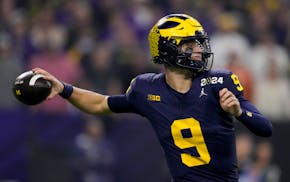We can criticize Wild management for holding on to Marian Gaborik past his expiration date, just as we criticized the Twins for losing Torii Hunter for nothing and Johan Santana for too little, just as we criticized the Timberwolves for trading Kevin Garnett for a handful of supporting players from a bad team.
We can criticize these teams, but we should do so with this caveat: Trading a superstar at the right time is tricky. "That's not easy," said Wolves coach Kevin McHale. "A lot of decisions go into that."
If there is a lesson to be learned from recent history, it is that smaller-market teams should trade superstars headed for free agency sooner rather than later, even though that very act might become the most unpopular move in franchise history.
It would have been difficult to trade Gaborik last year, when he was playing so well for a team surging into the playoffs, and it would have been difficult to trade Gaborik for equal value right after he went scoreless in the playoffs. When he reinjured what the Wild refers to as his "lower body" this season, trading him for value became impossible.
Should the Wild really have dumped him earlier? It's easy to say that now; few were saying it then.
It would have been difficult to trade Hunter before he reached free agency, because the Twins looked like World Series contenders. Now we know that they should have traded him a year earlier, but that would have been a highly unpopular move at the time.
It would have been difficult for the Twins to trade Santana two years before he became a free agent. How do you develop a Rule 5 draftee into one of baseball's elite pitchers, then dump him two years before he's eligible for free agency?
Trading him a year earlier, though, would have brought a much bigger ransom in a trade.
It would have been difficult for the Timberwolves to trade Garnett a year earlier than they did. His absence has proven that he held the franchise together, keeping it relevant even as the front office struggled to surround him with competent players. Trading him earlier, though, might have brought a better package in return, because Garnett would have been a year younger, a year closer to the spotlight of the Western Conference finals.
What we know now is that trading these stars before their free-agency expiration dates approached would have been unpopular, and wise.
Particularly in baseball, once a star player approaches free agency, he becomes subject to the whims of the market forces beyond a team's control. In other words, if the Yankees want your player, the Yankees will sign your player.
What is the immediate lesson to be learned from recent history?
That the Twins should sign Joe Mauer to a long-term deal as quickly as possible, because this is the rare athlete our local teams can't afford to trade, or lose, under any circumstances.
Mauer is due to become a free agent after the 2010 season. He has won two batting titles in the past three years -- the only two batting titles ever won by American League catchers. He has proved durable, tough and skilled, and as popular in his own clubhouse as he is with Twins fans who live in his hometown of St. Paul.
Mauer is the first of the four great baseball-playing St. Paulites -- Paul Molitor, Dave Winfield and Jack Morris are the others -- to begin his career with the Twins.
The Twins have spent less money this winter than your average debt-ridden consumer. They are under budget, and one year away from playing in their new, revenue-producing stadium. If ever a franchise was set up to sign a star player, it is today's Twins.
They should act before Mauer starts hearing how much fun it is to make $20 million a year and live in Manhattan.
Jim Souhan can be heard Sundays from 10 a.m.-noon on AM-1500 KSTP. • jsouhan@startribune.com

Souhan: Wolves fans made Game 1 special. Now bring on Game 2.

Souhan: Should Vikings even consider McCarthy in NFL draft?

Souhan: NAW erases Suns' lead, Game 1 advantage with big performance

Souhan: This is KAT's chance to prove Flip Saunders was right

